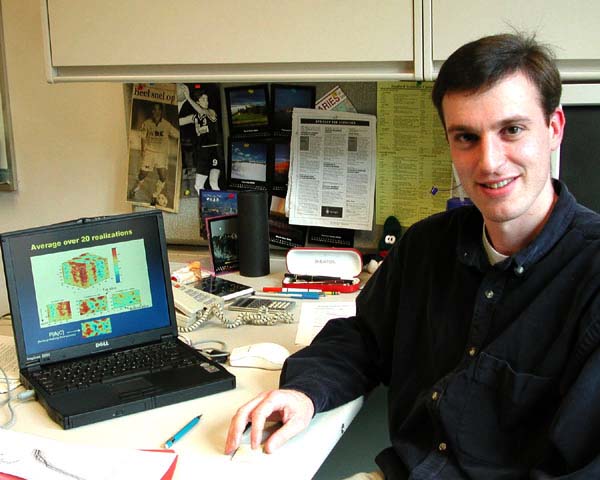
2001 Andrei Borisovitch Vistelius Research Award
of the International Association for Mathematical Geology

|
IAMG 2001--Cancún
2001 Andrei Borisovitch Vistelius Research Award |
|
Home Page
|
JEF CAERS Another name has sprung to the heights of Mathematical Geology and Geostatistics.
In little more than 3 years since graduating as a Ph.D. from the University of
Leuven (Belgium), Jef Caers has rushed through all academic steps as a visiting
scientist, a postdoc, a visiting professor, a co-director of one of the largest
industrial affiliates program in the US, to win a tenure-track position at
Stanford in a race where he was an outsider.
Another name has sprung to the heights of Mathematical Geology and Geostatistics.
In little more than 3 years since graduating as a Ph.D. from the University of
Leuven (Belgium), Jef Caers has rushed through all academic steps as a visiting
scientist, a postdoc, a visiting professor, a co-director of one of the largest
industrial affiliates program in the US, to win a tenure-track position at
Stanford in a race where he was an outsider.
Consider the performance,
I had recently a casual chat with Jef under clear skies, we both felt relaxed in the cocoon of Stanford campus, and then I asked him what specific event geared him towards an academic career. He said that as a graduate student he had little help, had to do the thinking mostly by himself and came to love research as a challenge to one's mind rather than mere learning from other people's mind. In the field of statistics of extremes, his Ph.D. topic, there was very little to learn from anyone anyway except that the world was either Gaussian or lognormal! He never believed in Central Limit theorems when applied to actual geo-data and he felt uneasy about the priority given by statisticians to parameter-poor models over actual data: the data could never speak by themselves. Why would an external analytical model be less adhoc than a model specially built to fit important traits of the data? This bias towards clean models, he thought was the consequence of the French mathematical bias pervading the next door French-speaking university. Jef is a proud Flemish Belgian! He also said that discovering a result by himself before reading it gave him the greatest joy. He knew then that he would do research not as a bookworm but as an athlete constantly putting himself to the test. Forget the well-trodden paths where people tend to beat the same models adding an umpteen decimal, give your naivete a chance, think by yourself, contribute possibly little but with genuine new ideas. I knew this man was of Stanford type, or is it of Silicon Valley type? Actually, Jef did inquire for the possibility of research positions in his alma mater in Belgium. He was given a whole list of administrative hurdles where age and patience were the sesame, nobody ever asked him about what he wanted to research or how he would go about it, he had the top degree from the place, that seems to be enough, the rest was a question of being in the correct waiting list! At Stanford they did not care about his degree or age, they looked at what he did recently and wanted to listen to him. They finally chose potential with its associated risk over past achievements. Once again Europe's loss is America's gain, when will that brain drain ever end? Let us cheer the newest Vistelius awardee! With Jef Caers our association keeps with its track record of early detection of future leaders.
A.G. Journel |